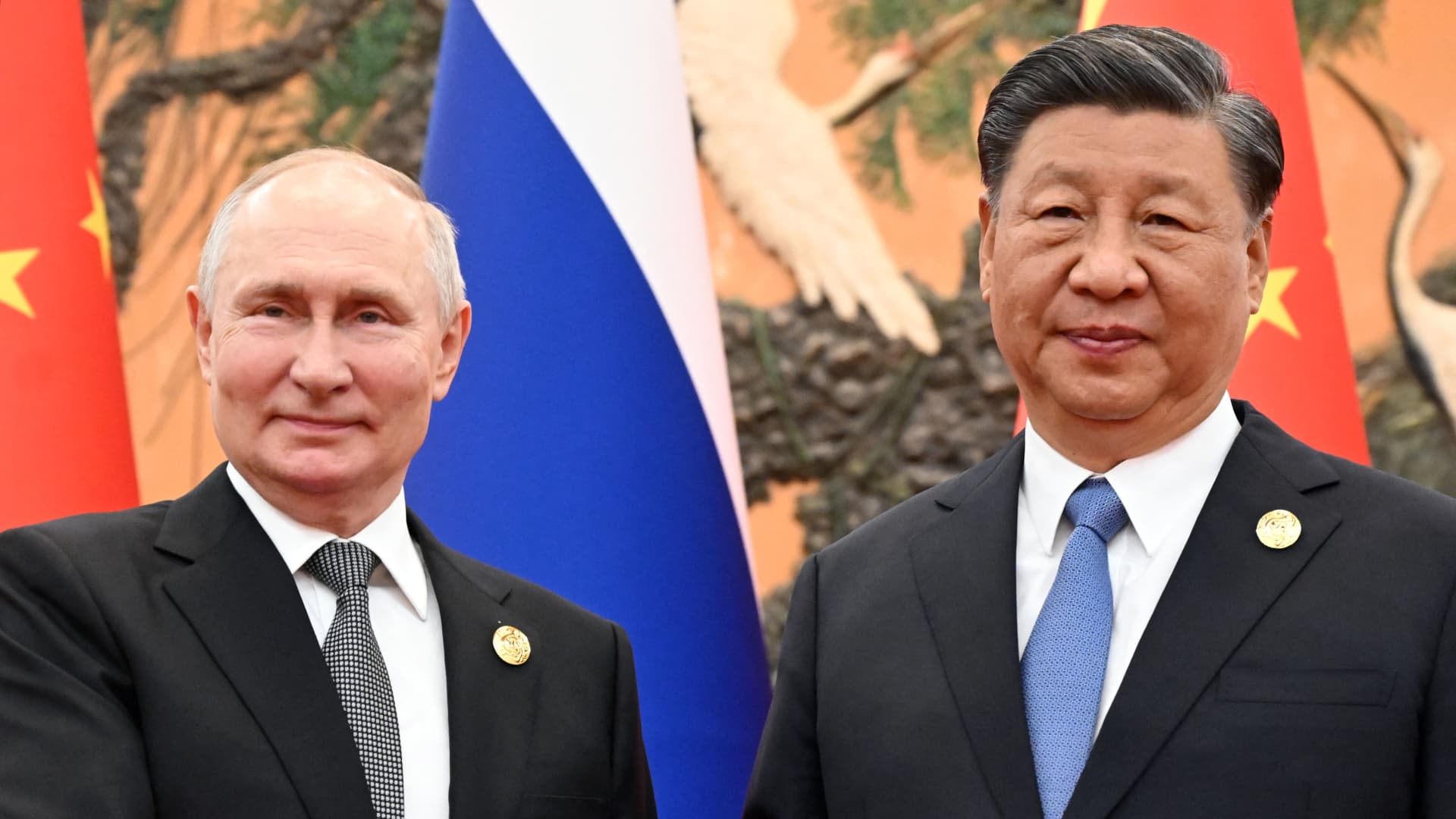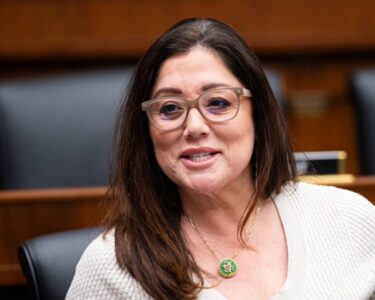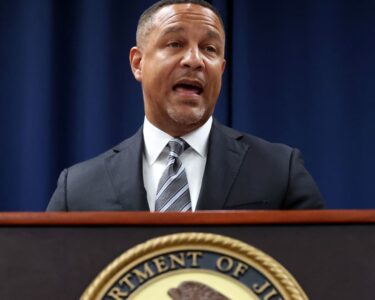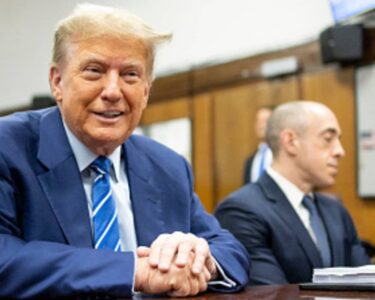This was CNBC’s live blog tracking developments on the war in Ukraine for November 8, 2023. See here for the latest updates.
Moscow and Beijing are not forming any military alliances reminiscent of “Cold War associations,” Russian President Vladimir Putin said as he made another thinly-veiled swipe at NATO.
Putin met Zhang Youxia, the deputy chairman of China’s Central Military Council on Wednesday as a wider delegation of Chinese defense officials visited Moscow.
“Russia and China are not building any military alliances following the example of the Cold War,” Putin said, alluding to coalitions like NATO — a Western military alliance formed after World War II that Russia heavily criticizes and repeatedly blames for stoking conflict.
Earlier, Russia’s defense ministry said talks with the Chinese would focus on “increasing bilateral cooperation in the defense sector.”
Announcing the visit, the ministry stated on Telegram that relations between Russia and China “are an example of strategic interaction based on trust and respect.”
Ukrainian President Volodymyr Zelenskyy thanked Japan and other G7 nations for their “unwavering support for Ukraine even amid other global developments” in a post on X, formerly known as Twitter.
Zelenskyy made special reference to Japanese Prime Minister Fumio Kishida, who he spoke to in order to “thank Japan for taking the lead in supporting Ukraine during its G7 presidency.”
The leaders reportedly discussed further financial support for Ukraine and work toward Zelenskyy’s 10-point peace plan.
— Hannah Ward-Glenton
Ukrainian President Volodymyr Zelenskyy said Wednesday that the first group of 43 Ukrainian nationals had been evacuated from Gaza.
In a post on social media, Zelenskyy said the group are now in Egypt. Alongside them are 36 Moldovan citizens who Kyiv also helped to transfer, he added.
— Karen Gilchrist
“A special operation” killed a Moscow-backed lawmaker in occupied Luhansk, Ukraine’s defense ministry wrote on Telegram.
“On November 8, 2023, at 08:40 a.m., as a result of a car explosion, the so-called deputy of the so-called “Supreme Council of the People’s Republic of Lugansk” from the Russian Party of the Liberal Democratic Party – Filipponenko Mikhail Yuryevich was eliminated,” the Telegram post said.
“He was involved in the organisation of torture camps in the occupied territories of Luhansk region, where prisoners of war and civilian hostages were subjected to inhumane torture. Filiponenko himself personally brutally tortured people,” the defense ministry added.
The lawmaker reportedly “died on the spot” as a result of the morning explosion.
CNBC was unable to independently verify the report.
— Hannah Ward-Glenton
Ukrainian President Volodymyr Zelenskyy praised the latest stage in the country’s attempt to join the European Union.
“This is a strong and historic step that paves the way to a stronger EU with Ukraine as its member. I thank the EU and personally [Ursula von der Leyen] for supporting Ukraine on our road to the EU,” Zelenskyy wrote on X, formerly known as Twitter.
The European Commission, the EU’s executive arm, published a report Wednesday that included a recommendation Kyiv be invited to begin membership talks as soon as its meets some final conditions, regardless of the continuation of the war with Russia.
“The Commission recommends that the Council opens accession negotiations with Ukraine and will monitor on the progress and compliance in all areas related to the opening of negotiations and report to the Council by March 2024,” the report said.
European leaders formally accepted Ukraine as a candidate to join the EU in June 2022.
— Hannah Ward-Glenton
Moscow and Beijing are not forming any military alliances “following the example of Cold War associations,” Russian President Vladimir Putin said Wednesday.
Putin met Zhang Youxia, the deputy chairman of China’s Central Military Council on Wednesday, as a wider delegation of Chinese defense officials visited Moscow.
“Russia and China are not building any military alliances following the example of the Cold War,” Putin said, alluding to coalitions like NATO — a Western military alliance formed after World War II that Russia heavily criticizes and repeatedly blames for stoking conflict.
“Our interaction with you is constructive and is a serious factor in stabilizing the international situation,” Putin said, as he addressed the Chinese delegation, according to Google-translated comments published by Russian state news agency Tass.
“Trade and economic ties are developing at a good pace. We are achieving the goals we have set for ourselves ahead of time, we are working on international platforms, in international organizations, primarily in the UN,” he listed.
According to the Russian president, Moscow and Beijing pay sufficient attention to regional platforms, which are “more and more acquiring a global character,” he said, referencing the Shanghai Cooperation Organization — a Eurasian political, economic, international security and defence alliance established by China and Russia in 2001 — and the so-called “BRICS” group of emerging markets, comprising Brazil, Russia, India, China and South Africa.
— Holly Ellyatt
Russia’s defense ministry said a delegation of Chinese military officials visited Moscow Wednesday with talks focused on “increasing bilateral cooperation in the defense sector.”
Announcing the visit, the ministry stated on Telegram that relations between Russia and China “are an example of strategic interaction based on trust and respect.”
“We, unlike some aggressive Western countries, are not creating a military bloc. Relations between Russia and China are an example of strategic interaction based on trust and respect,” Russian Defense Minister Sergei Shoigu said at negotiations with Zhang Youxia, deputy chairman of China’s Central Military Council.
“I am convinced that today’s meeting will be another step towards deepening multidisciplinary ties between our countries and military departments,” Shoigu said.
Ukraine’s Western allies have expressed concern over China and Russia’s deepening defense ties, with concerns that China was considering sending military equipment or dual-use technology to Moscow for use in Ukraine. Beijing denies sending military equipment to Russia.
— Holly Ellyatt
The U.S. is bankrupting its European “vassals” but continues to buy uranium and critical materials from Russia, Foreign Minister Sergei Lavrov said Wednesday.
“Washington is essentially ruining its European vassals and allowing its military-industrial complex to earn money,” the minister said at an embassy roundtable, according to comments published by Tass new agency.
“It imposed and continues to impose expensive American liquefied natural gas on the European Union, and with its selfish laws forces European companies to transfer enterprises overseas to where base costs are lower, and while forcing the EU to abandon everything Russian, Washington continues to buy uranium and other critical materials from Russia,” Lavrov said.
Washington has reluctantly admitted that it continues to source a large amount of uranium, the most-used fuel by nuclear power plants for nuclear fission, from Russia.
The U.S. Energy Information Administration said that in 2022, 12% of its uranium imports were from Russia. Canada, Kazakhstan and Uzbekistan also provided a share of its uranium imports. The U.S. has looked to reduce or ban uranium imports.
— Holly Ellyatt
A Russian-backed lawmaker in the city of Luhansk in eastern Ukraine was killed in a car bomb attack on Wednesday, the region’s Russian-backed governor said.
Mikhail Filiponenko, a lawmaker in the Russia-backed Luhansk assembly and a former top security official in the region, died after a bomb planted in a car exploded, a local news agency cited his son as saying.
Filiponenko, who had been active in Luhansk’s pro-Russian separatist movement since 2014, had served as one of the top commanders in the army of the so-called Luhansk People’s Republic.
In September, he was elected to the regional parliament in a vote that drew widespread international condemnation.
Bomb blasts targeting senior Russian-installed officials in parts of Ukraine Moscow claims as its own have been a regular occurrence since Russia ordered tens of thousands of troops into Ukraine in Feb. 2022.
Luhansk is one of four Ukrainian regions Russia claims to have annexed since the start of its invasion, something Kyiv and its Western allies strongly reject.
— Reuters
Ukraine’s military said on Tuesday its troops had repelled Russian assaults in widely separated sectors of the war and braced for a fresh attempt to capture the key frontline eastern town of Avdiivka.
Russia is engaged in a slow-moving campaign in eastern areas of the 1,000-km (600-mile) front line after failing in its bid to march on Kyiv in the conflict’s early days. Ukraine has registered only limited progress in a counteroffensive launched in the east and south in June.
Ukraine’s General Staff, in its evening report, said its forces had beaten back 15 attacks near Kupiansk in the northeast and 18 attacks near Maryinka further south, where battles have raged for months.
Nine attacks were repelled in and near Avdiivka, where Moscow launched the latest of several drives in mid-October. Vitaliy Barabash, head of Avdiivka’s military administration, said several days of rain had for the moment ruled out any new Russian advance — what he described as the “third wave”.
“We’ve had nearly a week of heavy rain,” he told the public broadcaster Suspilne. “The terrain is too difficult and equipment cannot move.”
Avdiivka has become a hallmark of Ukrainian resistance — and is seen as a gateway if Ukraine is to retake main areas in the east, including the town of Donetsk, 20 km away.
Occupied briefly when Russian-backed separatists seized large areas of eastern Ukraine in 2014, the town was retaken by Ukrainian forces who subsequently erected substantial fortifications around it.
Russian accounts of the fighting said Moscow’s troops had launched strikes on Ukrainian men and equipment in villages near the eastern town of Bakhmut, seized by Russian forces last May. Reuters could not independently confirm battlefield accounts made by either side.
— Reuters
“Ukraine can count on us,” U.S. Secretary of State Antony Blinken said Wednesday during a visit to Japan, where the Group of Seven’s foreign ministers are meeting.
“To put Ukraine on a solid foundation for the next year, we must help Ukraine do four things at once: first, keep fighting to win back its territory. Second, build a world class military force to ensure maximum deterrence in the future and make clear to President Putin that he cannot and will not outlast Ukraine, and he cannot and will not outlast all of Ukraine’s supporters,” Blinken said.
The comments from the U.S.’ top diplomat will do little to assuage concerns in Kyiv that the war in Ukraine has taken a backseat to the escalating conflict in the Middle East.
Ukraine’s President Volodymyr Zelenskyy said last weekend that the Israel-Hamas conflict is “taking away the focus” from Ukraine.
— Ruxandra Iordache, Holly Ellyatt
Seventeen months after the first incidents were reported, sabotage of Russian railways by anti-war activists “continues to represent a significant challenge for the Russian authorities,” the U.K.’s Ministry of Defence noted Wednesday.
Research by independent Russian media outlet Mediazona suggests that, as of October, 76 cases of railway sabotage have reached court since the war with Ukraikne began in Feb. 2022.
At least 137 people, with the vast majority aged under 24, had been prosecuted, the U.K. noted.
“Since early 2023, notices have been stencilled on key pieces of railway infrastructure pointing out that, under the Russian Criminal Code, sabotage can be punished with up to life imprisonment,” the ministry said in an intelligence update on X, formerly known as Twitter.
“Russia’s military logistics, including supplying the war in Ukraine, remain reliant on the country’s 33,000km of railway line. With virtually all methods of overt dissent banned in Russia, sabotage continues to appeal to a minority of young people as a method of protest” against the war.
— Holly Ellyatt
Russian President Vladimir Putin said Wednesday that a number of countries are acting in a way that is “directly aimed” at weakening power the post-Soviet space.
Speaking in a video message to the participants of the annual meeting of the secretaries of the security councils of the Commonwealth of Independent States (CIS) countries in Moscow, which opened on Wednesday, Putin said, in comments reported by RIA Novosti: “The actions of some countries are directly aimed at shaking the legitimate power, social stability and traditional values in the CIS countries, at violating our traditional close trade, cooperation, and cultural ties.”
Russia called on the CIS, a regional intergovernmental organization in Eurasia, to beef up collective security.
Putin said Russia and its neighbors faced common threats of terrorism, organized crime, drug trafficking and illegal migration, as well as radicalism and extremism.
The CIS includes Russia and former Soviet republics including Armenia, Azerbaijan, Belarus, Kazakhstan, Kyrgyzstan, Tajikistan and Uzbekistan. The Baltic States, firmly ensconced in the EU now, did not want to participate in the organization and Georgia withdrew its participation after a short-lived war with Russia in 2008. Moldova suspended its involvement after the invasion of Ukraine.
Putin added that the international situation remains extremely tense, commenting that “in a number of regions, old conflicts have escalated and new hotbeds of conflict have emerged. In particular, in the Middle East, where a new round of Palestinian-Israeli confrontation has been provoked, from which civilians are primarily suffering.”
— Holly Ellyatt
Russian Security Council Secretary Nikolai Patrushev, a senior Russian figure and close ally of President Vladimir Putin, claimed Wednesday that Ukraine tried to attack three nuclear power plants.
Speaking at a meeting in Moscow with colleagues from the Commonwealth of Independent States, Patrushev claimed that “the lack of success on the battlefield is forcing Kyiv to increasingly resort to terrorist methods, including assassinations and murders of Russian citizens, attacks on civilian objects and critical infrastructure,” he said, according to comments reported by Tass news agency.
“Similar actions were taken by the Ukrainian side in relation to the Leningrad, Kalinin and Kursk nuclear power plants,” he said.
Patrushev, who is perhaps the most influential figure in the Kremlin, said that on Oct. 26, Ukrainian drones hit a nuclear waste warehouse on the territory of the Kursk Nuclear Power Plant, an incident that Moscow condemned at the time, and said two other drones had hit the complex of its administrative buildings. Patrushev did not present evidence for his claims or give further detail. CNBC was unable to verify the comments.
Ukraine has not commented on the incidents and tends not to confirm or deny whether it has carried out military operations on Russian territory. Ukraine has been carrying out a counteroffensive to retake Russian-occupied territory since June, and much of the country has seen civilian infrastructure damaged or destroyed since Russia invaded in February 2022.
— Holly Ellyatt
Ukrainian President Volodymyr Zelenskyy proposed extending the current export ban on Ukrainian natural gas for the whole of 2024, according to a presidential decree, translated via Google.
Ukraine initially introduced the export ban soon after the invasion in February 2022, and it was then extended to cover 2023.
The decree included a proposal for the “establishment in 2024 of a zero export quota for gas of natural Ukrainian origin” in a list of measures to be taken within the next six months.
Russia’s invasion of Ukraine heavily impacted global gas supply chains, sending gas prices skyrocketing in the initial weeks of the war.
— Hannah Ward-Glenton
NATO allies on Tuesday condemned a decision by Russia to withdraw from the Treaty on Conventional Armed Forces in Europe, which was a key post-Cold War treaty, adding that, as a consequence, they intended to suspend the operation of the treaty as long as necessary
“Allies condemn Russia’s decision to withdraw from the Treaty on Conventional Armed Forces in Europe (CFE), and its war of aggression against Ukraine which is contrary to the Treaty’s objectives. Russia’s withdrawal is the latest in a series of actions that systematically undermines Euro-Atlantic security,” said NATO in a statement.
“Therefore, as a consequence, Allied States Parties intend to suspend the operation of the CFE Treaty for as long as necessary, in accordance with their rights under international law. This is a decision fully supported by all NATO Allies.”
Earlier on Tuesday, Russia had formally withdrawn from this landmark security treaty which limited key categories of conventional armed forces, blaming the United States for undermining post-Cold War security with the enlargement of the NATO military alliance.
— Reuterfs
A large convoy of Russia equipment is moving through the Russian-occupied southern Ukrainian city of Mariupol toward Berdiansk, and is believed to be en route to the strategic Russian-occupied stronghold of Tokmak, according to Petro Andriushchenko, an adviser to the usurped Ukrainian mayor of Mariupol.
“Military movement Melitopol – Mariupol. Convoys of equipment, helicopters near Berdiansk, dozens of trucks with ammunition [moving] through Mariupol,” he said on Telegram Tuesday, adding that the column was “disappearing” toward the front line.
Andriushchenko said it’s believed that Russia is looking to send reinforcements to the major rail and road hub Tokmak, an occupied city whose defense is seen as a priority for Russia as it looks to maintain its grip on a swathe of southern Ukrainian territory, including key cities Melitopol and Mariupol.
— Holly Ellyatt
NATO rebukes Russia for withdrawing from post-Cold War treaty; Kyiv slams talk of 2024 elections






